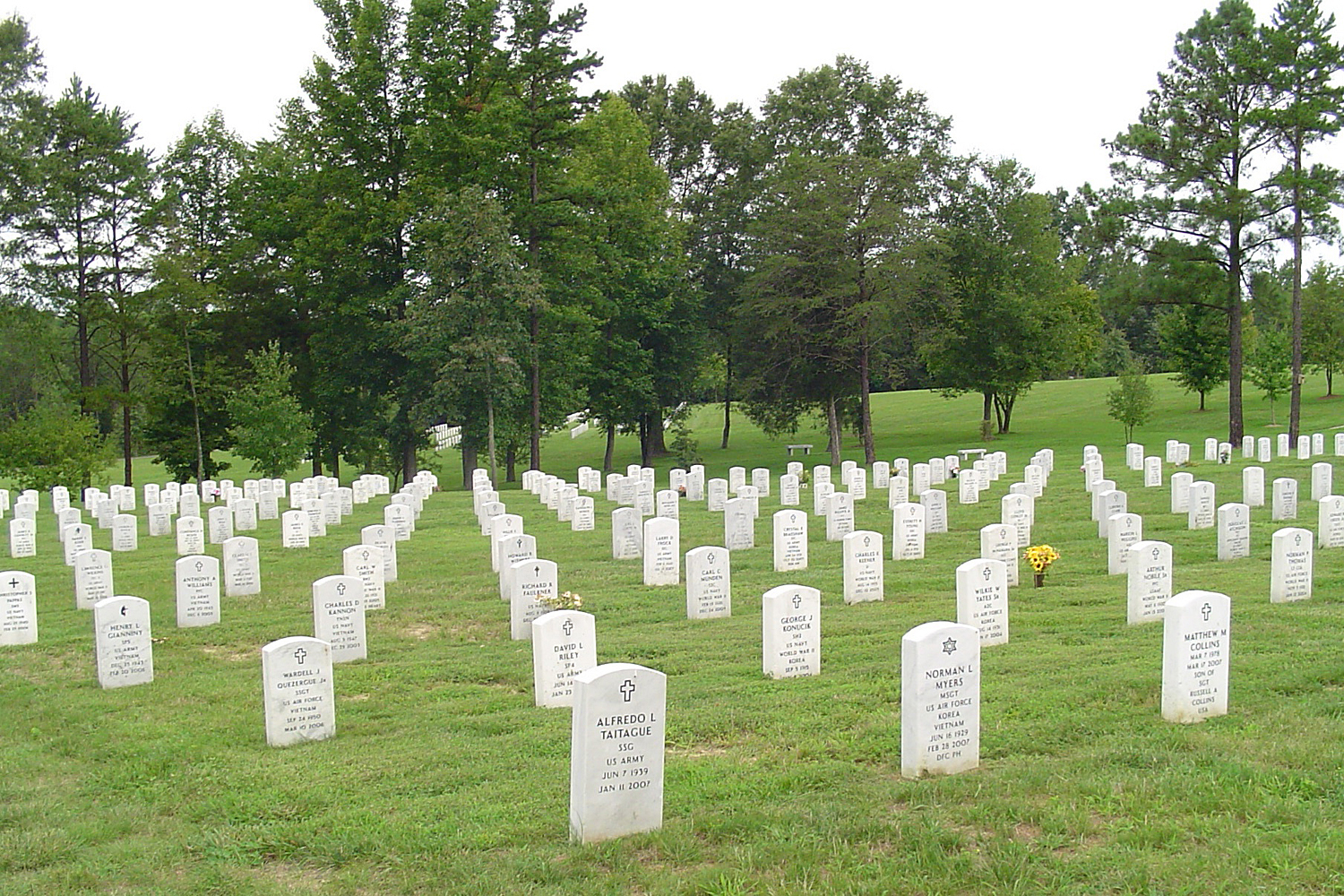January 15, 2008 — A study conducted by the University of Virginia's Weldon Cooper Center for Public Service recommends that a new veterans' cemetery be located in Nelson County to meet the burial needs of Virginia's large and growing veteran population.
Terance J. Rephann, a research associate in the Cooper Center, conducted the study at the request of Virginia's Department of Veterans Services.
Currently Virginia hosts three national cemeteries, located in Arlington County, Quantico and Culpeper County, and two state veterans cemeteries in Amelia County and Suffolk. Plans call for a new veterans' cemetery to be built in Pulaski County by 2012.
In recommending a site in Nelson County that would serve Lynchburg, Buena Vista, Lexington, Waynesboro and Charlottesville, the study further concludes that veterans' cemeteries should have a 50-mile distance service standard in state cemetery planning.
Currently, the National Cemetery Administration uses a 75-mile cemetery service area boundary. But the Cooper Center study found that "the vast majority of veteran interments are drawn from within 50 miles of a state cemetery, with even higher likelihoods of veteran burial occurring for those areas in closer proximity to each cemetery. This result conforms to some national research that indicates the 75-mile boundary may be too large."
In addition, the report notes that the 75-mile boundary does not factor in actual travel time from various locations.
"Veterans," said Rephann, "have a strong preference for being buried closer to their families."
The burial needs of Virginia's veterans have been impacted by a variety of factors in recent years, the report said.
Although Virginia has been served by a number of national cemeteries located in the state, most of these have closed in the last four decades and the Culpeper National Cemetery may reach capacity in the next 20 years unless additional land is acquired.
In addition, the number of annual veteran deaths projected over the next few decades will be high by historic standards, and many veterans currently reside outside a reasonable traveling distance to a state or national cemetery.
The report also noted that some aging veteran cohorts, such as Vietnam veterans, may increasingly favor veteran cemetery interment.
At the same time, the study cited two factors that will contribute to decreasing consumption of cemetery space over the long term. On the one hand, Virginia veteran deaths are projected to drop below estimates by 2020. In addition, veterans are showing increasing preference for cremation over traditional casket burial, resulting in decreased space requirements.
According to Rephann, one of the findings of the study was that many veterans are unaware of their burial benefits.
"About 40 percent of veterans do not know that they are eligible to be buried in a national or state cemetery," said Rephann. "There is a need to get that word out."
Rephann said that the report has now been delivered to the Department of Veterans Service for potential inclusion in its long-term planning.
Terance J. Rephann, a research associate in the Cooper Center, conducted the study at the request of Virginia's Department of Veterans Services.
Currently Virginia hosts three national cemeteries, located in Arlington County, Quantico and Culpeper County, and two state veterans cemeteries in Amelia County and Suffolk. Plans call for a new veterans' cemetery to be built in Pulaski County by 2012.
In recommending a site in Nelson County that would serve Lynchburg, Buena Vista, Lexington, Waynesboro and Charlottesville, the study further concludes that veterans' cemeteries should have a 50-mile distance service standard in state cemetery planning.
Currently, the National Cemetery Administration uses a 75-mile cemetery service area boundary. But the Cooper Center study found that "the vast majority of veteran interments are drawn from within 50 miles of a state cemetery, with even higher likelihoods of veteran burial occurring for those areas in closer proximity to each cemetery. This result conforms to some national research that indicates the 75-mile boundary may be too large."
In addition, the report notes that the 75-mile boundary does not factor in actual travel time from various locations.
"Veterans," said Rephann, "have a strong preference for being buried closer to their families."
The burial needs of Virginia's veterans have been impacted by a variety of factors in recent years, the report said.
Although Virginia has been served by a number of national cemeteries located in the state, most of these have closed in the last four decades and the Culpeper National Cemetery may reach capacity in the next 20 years unless additional land is acquired.
In addition, the number of annual veteran deaths projected over the next few decades will be high by historic standards, and many veterans currently reside outside a reasonable traveling distance to a state or national cemetery.
The report also noted that some aging veteran cohorts, such as Vietnam veterans, may increasingly favor veteran cemetery interment.
At the same time, the study cited two factors that will contribute to decreasing consumption of cemetery space over the long term. On the one hand, Virginia veteran deaths are projected to drop below estimates by 2020. In addition, veterans are showing increasing preference for cremation over traditional casket burial, resulting in decreased space requirements.
According to Rephann, one of the findings of the study was that many veterans are unaware of their burial benefits.
"About 40 percent of veterans do not know that they are eligible to be buried in a national or state cemetery," said Rephann. "There is a need to get that word out."
Rephann said that the report has now been delivered to the Department of Veterans Service for potential inclusion in its long-term planning.
Media Contact
Article Information
January 15, 2008
/content/weldon-cooper-center-releases-study-cemeteries

